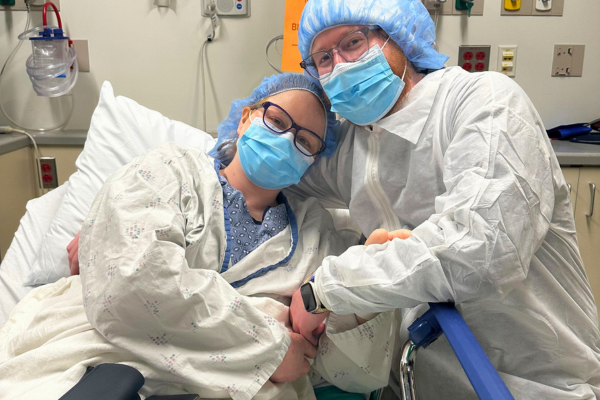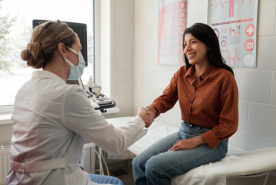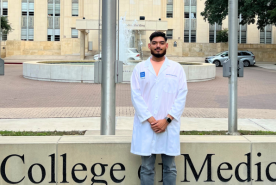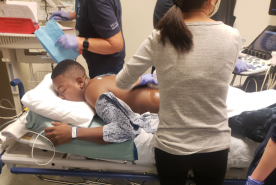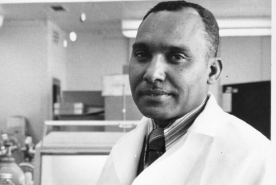September 12, 2024
Imagine you're in fifth grade, striving for the perfect attendance award, only to find yourself facing a life-threatening illness. For Kayla St. Pierre, this wasn't an imaginary scenario but a reality. In March 2000, what began as a typical school day ended in a bacterial meningitis diagnosis that changed her life.
A Deadly Diagnosis
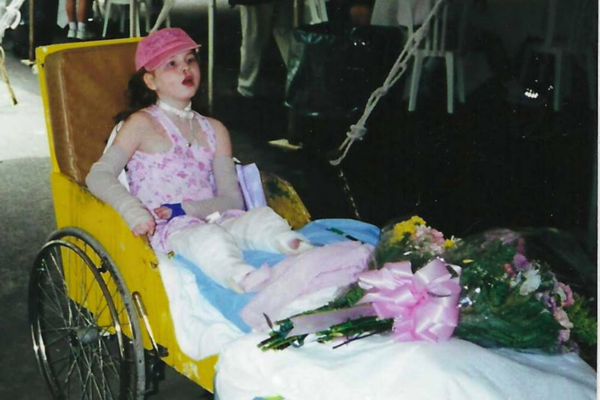
While Kayla didn't feel amazing that morning, she insisted on attending school.
"I wanted the perfect attendance award," Kayla said. “I felt worse as the day progressed so I went to the nurse. They sent me home thinking I had the flu. I spent the rest of the day at home and fell asleep on the couch. I woke up covered in purple blotches."
Kayla knew something was seriously wrong. She went to her parents, who rushed her to the emergency room.
"I was diagnosed with bacterial meningitis," Kayla said. "I had a 10% chance of surviving the night."
Bacterial meningitis causes inflammation around the brain and spinal cord tissue. It is a severe infection that can cause death within 24 hours. Around 1 in 6 people with bacterial meningitis die. 1 in 5 have severe complications.1
"I don't have many memories of this time. I was on a lot of pain medication. Then I was placed in a medically induced coma. I don’t remember, but the doctors told me they were amputating part of my legs and fingers," Kayla said. "Waking up a month later without my legs from the knee down and most of my fingers was traumatic."
Kayla's kidneys also failed. She spent the next ten months in the hospital undergoing dialysis, surgery to give her more use of her limbs, and intense physical therapy. But this wasn't the only challenge Kayla faced.
"My parents had a lot of other responsibilities to attend to while I was sick. It was a bit lonely but I met a plastic surgery nurse practitioner named Heather who helped me through the surgeries," said Kayla. "Then my mother passed away."
Between Kayla's medical needs and her siblings, it was unlikely her father would be able to provide her with the best care. That's when Heather stepped in.
"Heather and her husband Tony became my guardians. When I recovered enough to leave the hospital, they took me home and changed my life," Kayla said, "By that point, my kidney function returned. I didn't need dialysis and could focus on healing."
A Remarkable Recovery
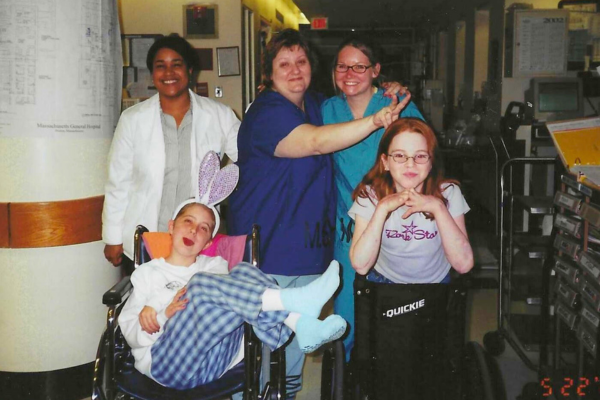
Now home, Kayla’s healing journey began in earnest. Over the next year, she managed her kidney function through a strict diet, underwent multiple surgeries, and worked on her physical strength.
"Even at eleven I was worried about my independence," Kayla said. "Would I ever walk or gain more function in my hands? The feelings of fear and powerlessness made me fight a lot of the physical therapy and exercise I needed to do to gain back that independence."
Heather and Tony never gave up on Kayla. They continued to work with her to overcome these difficulties.
"In the beginning of 2002 my kidneys failed again. There was no saving them this time. Since I was a child, I received dialysis at the hospital," Kayla said. "Adding dialysis treatments three days a week for hours at a time was tough."
That's when Heather and Tony decided to adopt Kayla. Tony immediately began the kidney donor evaluation process, determined to give Kayla a second chance at life.
"Six months after they adopted me, Tony told me he was my match. He was giving me a kidney," Kayla said. "I was in disbelief that anyone could be so kind and giving to someone who
wasn't their own blood."
On July 30th, 2002, Kayla and Tony had their transplant surgeries. Both were successful!
"After my transplant, I still had struggles related to meningitis, but I persevered. I graduated high school and went to college. I received a degree in psychology and in nursing," Kayla said. "My adoptive parents were there through it all. They are still some of my biggest supporters."
Are you interested in living kidney donation? Take 'Becoming a Living Donor,' NKF's free online course, to learn more.
Join the NKF Blog Newsletter
Get inspirational stories and kidney disease resources delivered to your inbox every month. You'll gain practical insights and expert advice to help you better understand and manage your kidney health no matter where you are on your kidney journey. Subscribe today.
A Return to Dialysis
Kayla's transplant lasted for 17 years before it began to fail.
"My kidney declined slowly. My creatinine crept up and I started having uremia symptoms, including fatigue and brain fog. I was itchy and stopped urinating," said Kayla. "I was panicking, wondering how I would survive dialysis as an adult."
As a nurse, Kayla understands the risks of kidney failure and dialysis, like heart problems, infections, or mineral and bone disorders. Despite these fears, Kayla faced kidney failure head-on.
"I had to pause my nursing career. Dialysis is my full-time job now. It is life-giving but it also takes. I don't have the energy to do the things I used to," said Kayla. "I am lucky to have an incredible support system right now–my adopted family and biological family who I rekindled my relationship with. I also have my friends and the people at my dialysis clinic."
On the days when Kayla struggles most, these people remind her not to give up.
"My support system is instrumental to my health. They are there whether I need a ride to dialysis, meals, or someone to talk to," said Kayla. "Moving forward, I'm focused on my health, hoping for another transplant, and advocating."
An Unshakable Advocate
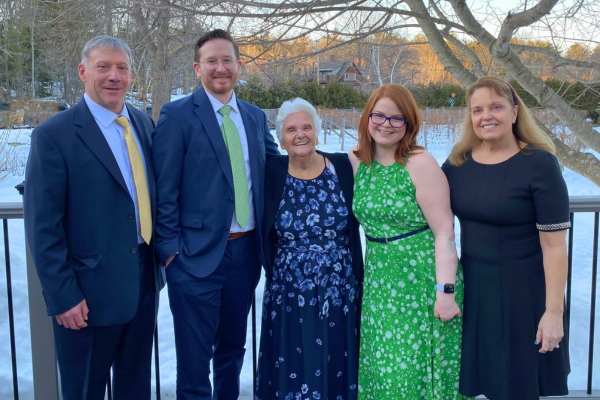
Kayla began her advocacy journey at fourteen.
"The National Meningitis Association (NMA) asked me to share my story. It was one of the most empowering experiences of my life. It taught me to advocate for others and myself," Kayla said. "I was young and inexperienced with the medical system. That experience gave me the confidence to take charge of my life."
Every year, an estimated 4 million deaths are prevented worldwide by childhood vaccinations.2 Kayla has been spreading the word.
"I lost my legs and fingers from a vaccine preventable disease. I almost died. I want to save others from that," said Kayla. "While I receive negative comments in my vaccine advocacy, it's still worth sharing. So many people can be spared from harm by vaccinations."
Kayla also educates others about kidney disease and transplantation.
"One in three people are at risk of kidney disease. There are around 90 thousand people waiting for a kidney transplant. Many don't know the risk factors of kidney disease and kidney failure like high blood pressure or diabetes," Kayla said. "I highly recommend going to the doctor, getting tested, and advocating for yourself–especially if you have any risk factors."
This education isn’t only for those at risk. Kayla also shares what she knows with her friends at the dialysis clinic.
“The more I learn about kidney disease and dialysis, the safer I feel,” Kayla said. “National Kidney Foundation has been a huge help with that. I love the educational materials offered on kidney.org. I often share them at dialysis to help others feel as informed as I do.”
Are you at risk of kidney disease? Take our one-minute quiz to learn more.
Sources
1“Meningitis.” World Health Organization, World Health Organization, www.who.int/news-room/fact-sheets/detail/meningitis. Accessed 19 Aug. 2024.
2“Fast Facts on Global Immunization.” Fast Facts on Global Immunization, Centers for Disease Control and Prevention, www.cdc.gov/global-immunization/fast-facts/index.html. Accessed 19 Aug. 2024.
